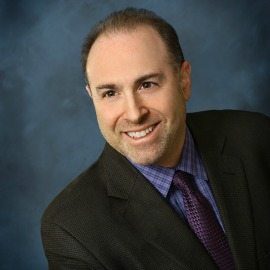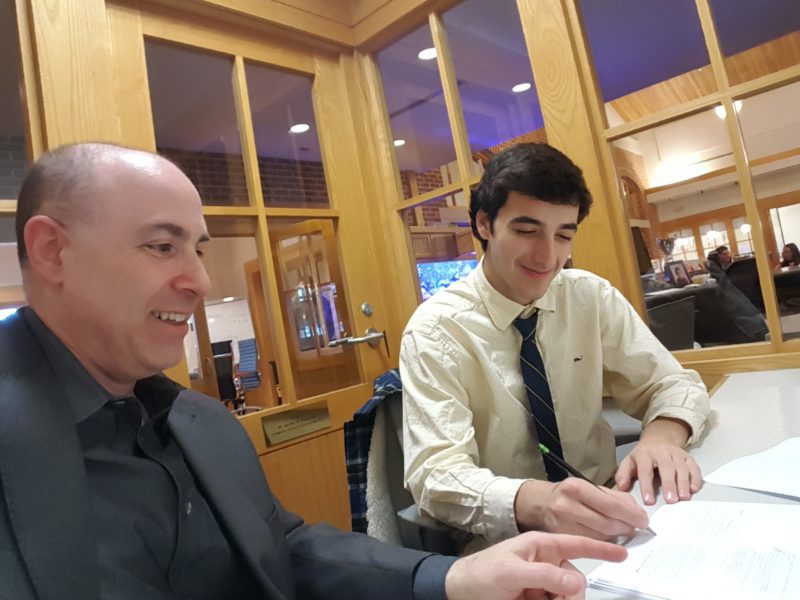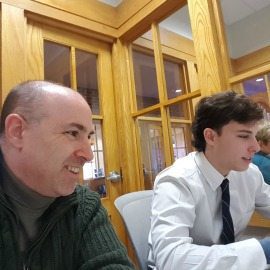
Robert Grossman knows first-hand how difficult obtaining an education can be when you’re only ever shown part of the picture.
“In some sense, I was no different in high school from the students I’m teaching,” said Grossman, a Fairfax County resident and founder of Grossman Educational Group (GEG), which offers comprehensive tutoring and guidance services. “I want my students to ‘get’ the big picture sooner so that the academic superstructure makes more sense to them. I want to provide them with a powerful vocabulary. As a young learner, I had always been curious to unearth the ‘big picture.’”
As a 20-something, Grossman trained as an academic, spending 13 years studying language, literature, social theory, aesthetics, philosophy and education at undergraduate and graduate levels. He completed graduate studies at the University of Virginia, where he also taught German, comparative literature and drama before moving to Northern Virginia.
“We founded Grossman Educational Group to help parents discover the right learning pathway for their children, knowing that each child has unique cognitive, developmental, emotional and psychological needs, and that no one pathway is right for every student,” Grossman said. “Our job is to help parents and students navigate their educational journey together. Our job is to take the stress away by acting as their advocate, mentor and resource.”
His wife Maria and brother Andrew also work for GEG. In addition, Grossman contracts with counselors, tutors, learning experts and other professionals who fill in as needed. GEG offers services for preschool through graduate school.
Some of the many services they offer include standardized test preparation (from SSAT/ISEE/HSPT and SAT/ACT to GMAT, GRE and LSAT), academic subject and AP exam tutoring, college consulting, specialized support for students with learning disabilities, academic enrichment, independent school and college placement (including transfers from within the US and overseas), and individually designed homeschooling curriculum.
GEG typically serves between 50 and 75 families at a time from the DC Metro region, and also serves clients in New York, Pittsburgh, Boston, Los Angeles, China, Ivory Coast and the United Kingdom. The website can be found at www.grossmaneducation.squarespace.com. The business has been built entirely by word of mouth. Grossman estimates he has personally worked with more than 1,500 families.
WashingtonExec recently spoke with Grossman about GEG and his thoughts on several educational issues:

WashingtonExec: What are some common learning gaps you see, and how can they be addressed?
Grossman: Students don’t generally understand why a particular class is relevant or how it relates to their other subjects. For example, in U.S. History, few students learn in depth about how the 18th- or 19th-century economy actually functioned, so when they memorize boldfaced terms in their textbooks like tariffs, the Navigation Acts, the Molasses Act, the Free Silver movement, “greenback” and “specie circular,” they lack a clear context for historical evolution of American capitalism.
Teachers rarely have the class time to go in depth. So, when students come to me confused, I know how to help them. Many of their difficulties come back to the problem of connecting complex topics like the economy to other ideological or cultural elements that complete the global picture.
WashingtonExec: What are some approaches you find universally helpful for students looking to reach their potential?
Grossman: Students are by nature very content driven, and school today is performance driven through an overemphasis on homework and GPA. But I think the development of a mature mind requires the ability to see the form that structures content. Our academic mentorship approach encourages students to become active, self-conscious participants in their own education. We want them to cultivate mature judgment and self-confidence. Students also need to understand the frameworks that shape human knowledge and experience, which is rarely taught in school. As someone who spent many years studying language, I encourage my students to become precise thinkers who are mindful that language is the ultimate medium and horizon of knowledge.
WashingtonExec: What was your own school experience like?
Grossman: I attended public school in suburban New Jersey, about 20 miles from NYC. Part of the motivation I have as an educator comes from the recognition that many of the frameworks that I use to navigate the world of ideas as an adult were wholly absent from my childhood education.
For example, until my senior year of high school, I didn’t even really understand that there was even such a thing as a literary tradition that is consciously constructed. For most high school students of English, books are just “random” things “from a certain time” rather than historical elements of a conversation between authors of different centuries with a shared literary past. I never lose the chance to share the staggering extent of this tradition with my students who are just as unaware of its omnipresence.

WashingtonExec: How can educators help students achieve higher in STEM fields?
Grossman: STEM fields present a special challenge because accelerated students are often pushed into a STEM pathway because of their natural gifts for math, while others on normal developmental pathways in math who nonetheless harbor a genuine passion for science, technology and design can be dissuaded by the advancement of their peers. I think this tendency to overaccelerate kids in math –just for the sake of advancing quickly—does little to help them long term. Most 40-year-old managers are not doing AP calculus, even if they are engineers. I certainly don’t think students should be held back from developing their gifts, but this enrichment often comes at the expense of under-developing their weaker areas — language and communication skills — which will be more important to their professional futures. I think that students with a passion for STEM should focus on applied math, problem solving or programming. Lately, we’ve heard the term STEAM instead of STEM, which includes the arts, and I think that term reminds parents that aesthetics is part of engineering.
WashingtonExec: What are some of the needs you fill that teachers or educational institutions would have trouble filling on their own?
Grossman: Many students need a one-on-one tutor to understand the small details of classroom work or to understand the big picture. In a classroom of 35, students rarely have enough contact time with the instructor, and teachers often move quickly to cover all the material in an advanced course and cannot stop to review or provide deeper context. Parents also feel that they are not getting enough guidance from their schools about college admissions and rely too much on hearsay. Parents and students often ignore or are in denial about signs of learning disabilities or do not address them effectively at an early enough age. Many only really begin to confront them in 10th or 11th grade when the workload exceeds their ability to compensate or a disappointing PSAT raises a red flag. Good educational advisers can plan a successful pathway and link parents to other consultants and form a success team. We can also support parents who need guidance with curricular choices or advocate for positive learning outcomes with school administrators and special education committees in settings such as IEP and 504 meetings. We can also connect parents with top specialists in psycho-educational testing to facilitate accommodations in school and for standardized tests, and work in conjunction with families to develop a successful test preparation scheme to support their individual cognitive profiles, and train them appropriately. We have also designed and administered home schooling curricula for students of varying learning abilities from year to year in a variety of subjects.
SaveSave

